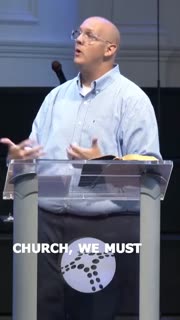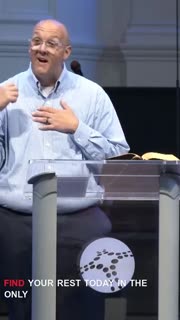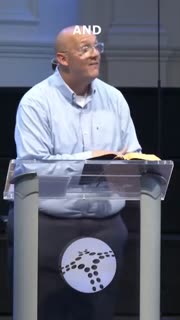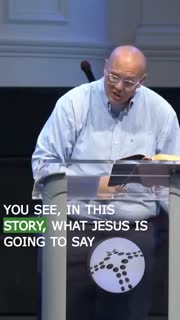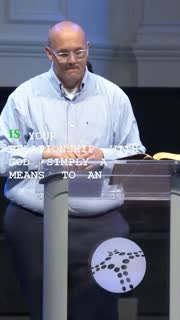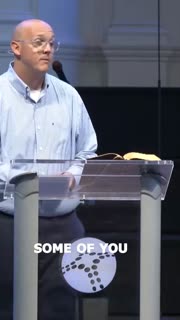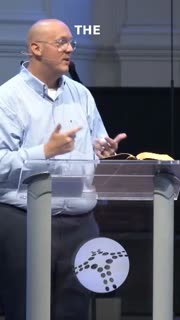God's Heart for the Lost: A Call to Repentance
Devotional
Sermon Summary
Bible Study Guide
Sermon Clips
### Quotes for Outreach
1. "Church, we must be celebrating with one another when those that are lost come to faith in Jesus Christ. That is our call. That's what Jesus is pointing us to here as he's saying this." [37:03] (12 seconds)
2. "Find your rest today in the only relationship that's ever going to satisfy a relationship with the father." [42:50] (7 seconds)
3. "God's love and his forgiveness is bigger than your sin and your shame. There's no sin that you can ever do that's going to discredit what Jesus did on the cross. You don't have to earn it. You just have to come to him in repentance." [48:46] (17 seconds)
4. "Run to the father. He is enough. He is truly satisfying. There is rest in him, joy in him. There is peace in him. He paid it all by giving up his son, Jesus, for you. You're not too lost for Jesus to find you. You're not too dirty in your sin for Jesus to cleanse you." [01:04:10] (25 seconds)
### Quotes for Members
1. "You see, in this story, what Jesus is going to say is that both the irreligious and the religious are spiritually lost on their own accord. So then Jesus begins to tell this parable. He tells three stories and it's all pointing to one point." [34:13] (19 seconds)
2. "Is your relationship with God simply a means to an end? Do you want God to answer all your prayers and give you his blessings? father's response is amazing. The listeners would expect the father to do what would have been okay in the custom, which was drive the son out of the family and out of the village, or even by the letter of the law could have stoned him to death for this request." [39:50] (28 seconds)
3. "Some of you guys have been running for a long time and you need to come to your senses and remember who your heavenly father is. This is what he does. And so he starts to come up with this plan. Verse 18 says, I'm going to arise. I'm going to go to my father and I'm going to say to him, father, I've sinned against heaven and against you. I'm no longer worthy to be called your son. Just treat me as one of your hired servants." [44:23] (22 seconds)
4. "The heart of the father doesn't divide us into good guys and bad guys, into elder brothers and younger brothers. You see, his gospel, it is not religious or irreligious. It's not moral or immoral. It's not Clemson or Carolina. It's not conservative or liberal. It's different altogether. It's everyone is wrong, everyone is loved, and everyone is called to recognize this and turn and run to the father. This is the call of the gospel." [01:01:05] (26 seconds)
5. "You see, what the father does in verse 20 and what he does in verse 28 is the same thing that he does here with you, is that the father pursues you. He may see you at a long way off because you're wayward in your sin and you know all the stuff that you're done, and he's not going to leave you out there. He's going to run after you." [58:05] (18 seconds)
Ask a question about this sermon
1. "Church, we must be celebrating with one another when those that are lost come to faith in Jesus Christ. That is our call. That's what Jesus is pointing us to here as he's saying this." [37:03] (12 seconds)
2. "Find your rest today in the only relationship that's ever going to satisfy a relationship with the father." [42:50] (7 seconds)
3. "God's love and his forgiveness is bigger than your sin and your shame. There's no sin that you can ever do that's going to discredit what Jesus did on the cross. You don't have to earn it. You just have to come to him in repentance." [48:46] (17 seconds)
4. "Run to the father. He is enough. He is truly satisfying. There is rest in him, joy in him. There is peace in him. He paid it all by giving up his son, Jesus, for you. You're not too lost for Jesus to find you. You're not too dirty in your sin for Jesus to cleanse you." [01:04:10] (25 seconds)
### Quotes for Members
1. "You see, in this story, what Jesus is going to say is that both the irreligious and the religious are spiritually lost on their own accord. So then Jesus begins to tell this parable. He tells three stories and it's all pointing to one point." [34:13] (19 seconds)
2. "Is your relationship with God simply a means to an end? Do you want God to answer all your prayers and give you his blessings? father's response is amazing. The listeners would expect the father to do what would have been okay in the custom, which was drive the son out of the family and out of the village, or even by the letter of the law could have stoned him to death for this request." [39:50] (28 seconds)
3. "Some of you guys have been running for a long time and you need to come to your senses and remember who your heavenly father is. This is what he does. And so he starts to come up with this plan. Verse 18 says, I'm going to arise. I'm going to go to my father and I'm going to say to him, father, I've sinned against heaven and against you. I'm no longer worthy to be called your son. Just treat me as one of your hired servants." [44:23] (22 seconds)
4. "The heart of the father doesn't divide us into good guys and bad guys, into elder brothers and younger brothers. You see, his gospel, it is not religious or irreligious. It's not moral or immoral. It's not Clemson or Carolina. It's not conservative or liberal. It's different altogether. It's everyone is wrong, everyone is loved, and everyone is called to recognize this and turn and run to the father. This is the call of the gospel." [01:01:05] (26 seconds)
5. "You see, what the father does in verse 20 and what he does in verse 28 is the same thing that he does here with you, is that the father pursues you. He may see you at a long way off because you're wayward in your sin and you know all the stuff that you're done, and he's not going to leave you out there. He's going to run after you." [58:05] (18 seconds)
